CNA346 - Nursing: Self-Evaluation of Skills in Transition to Practice
VerifiedAdded on 2023/04/26
|7
|1353
|162
Essay
AI Summary
This essay presents a self-evaluation of nursing skills within the context of transitioning to professional practice. It addresses key competencies related to shared governance, clinical governance, and self-governance, drawing upon practical experiences to illustrate the application of these principles. The discussion covers the importance of communication and interpersonal skills in multidisciplinary teams, the role of reflective and evidence-based practice in ensuring quality patient care, and the commitment to ongoing professional development. Examples from the author's experience, such as caring for stroke patients in a rehabilitation center, are used to demonstrate the integration of theory and practice. The essay emphasizes the need for continuous learning and skill enhancement to provide the best possible care and maintain high standards of clinical governance.

Running head: TRANSITION TO PRACTICE
TRANSITION TO PRACTICE
Name of the student:
Name of the university:
Author note:
TRANSITION TO PRACTICE
Name of the student:
Name of the university:
Author note:
Paraphrase This Document
Need a fresh take? Get an instant paraphrase of this document with our AI Paraphraser
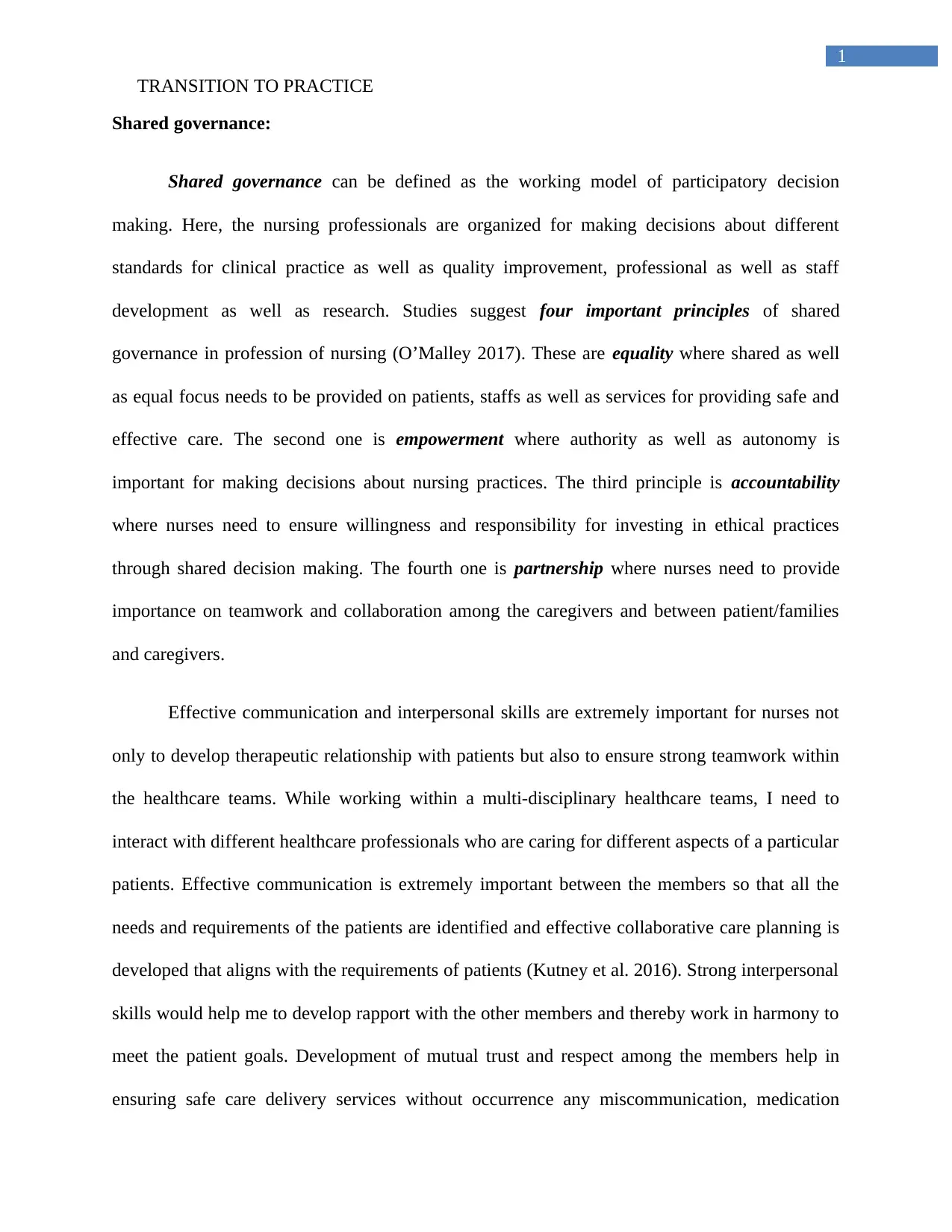
1
TRANSITION TO PRACTICE
Shared governance:
Shared governance can be defined as the working model of participatory decision
making. Here, the nursing professionals are organized for making decisions about different
standards for clinical practice as well as quality improvement, professional as well as staff
development as well as research. Studies suggest four important principles of shared
governance in profession of nursing (O’Malley 2017). These are equality where shared as well
as equal focus needs to be provided on patients, staffs as well as services for providing safe and
effective care. The second one is empowerment where authority as well as autonomy is
important for making decisions about nursing practices. The third principle is accountability
where nurses need to ensure willingness and responsibility for investing in ethical practices
through shared decision making. The fourth one is partnership where nurses need to provide
importance on teamwork and collaboration among the caregivers and between patient/families
and caregivers.
Effective communication and interpersonal skills are extremely important for nurses not
only to develop therapeutic relationship with patients but also to ensure strong teamwork within
the healthcare teams. While working within a multi-disciplinary healthcare teams, I need to
interact with different healthcare professionals who are caring for different aspects of a particular
patients. Effective communication is extremely important between the members so that all the
needs and requirements of the patients are identified and effective collaborative care planning is
developed that aligns with the requirements of patients (Kutney et al. 2016). Strong interpersonal
skills would help me to develop rapport with the other members and thereby work in harmony to
meet the patient goals. Development of mutual trust and respect among the members help in
ensuring safe care delivery services without occurrence any miscommunication, medication
TRANSITION TO PRACTICE
Shared governance:
Shared governance can be defined as the working model of participatory decision
making. Here, the nursing professionals are organized for making decisions about different
standards for clinical practice as well as quality improvement, professional as well as staff
development as well as research. Studies suggest four important principles of shared
governance in profession of nursing (O’Malley 2017). These are equality where shared as well
as equal focus needs to be provided on patients, staffs as well as services for providing safe and
effective care. The second one is empowerment where authority as well as autonomy is
important for making decisions about nursing practices. The third principle is accountability
where nurses need to ensure willingness and responsibility for investing in ethical practices
through shared decision making. The fourth one is partnership where nurses need to provide
importance on teamwork and collaboration among the caregivers and between patient/families
and caregivers.
Effective communication and interpersonal skills are extremely important for nurses not
only to develop therapeutic relationship with patients but also to ensure strong teamwork within
the healthcare teams. While working within a multi-disciplinary healthcare teams, I need to
interact with different healthcare professionals who are caring for different aspects of a particular
patients. Effective communication is extremely important between the members so that all the
needs and requirements of the patients are identified and effective collaborative care planning is
developed that aligns with the requirements of patients (Kutney et al. 2016). Strong interpersonal
skills would help me to develop rapport with the other members and thereby work in harmony to
meet the patient goals. Development of mutual trust and respect among the members help in
ensuring safe care delivery services without occurrence any miscommunication, medication
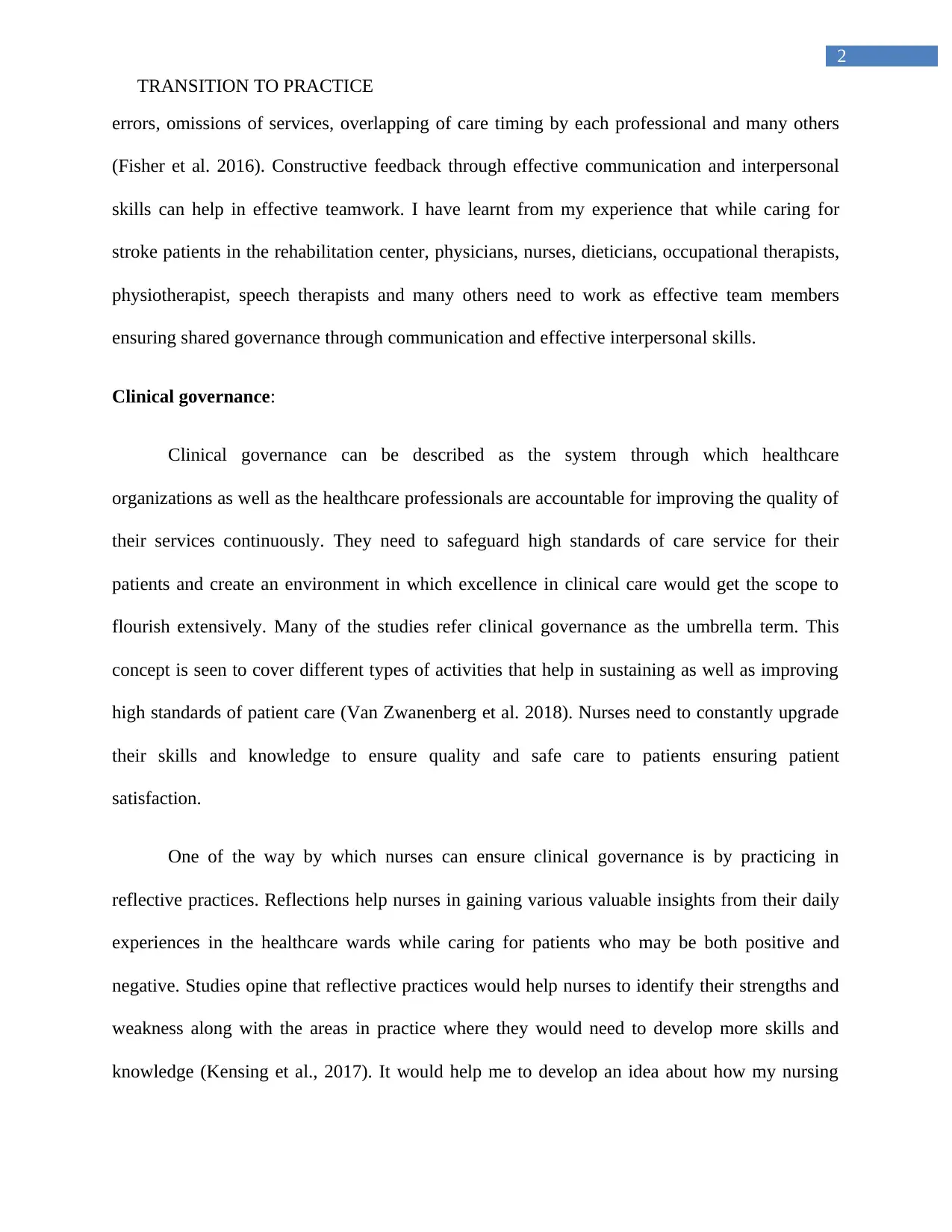
2
TRANSITION TO PRACTICE
errors, omissions of services, overlapping of care timing by each professional and many others
(Fisher et al. 2016). Constructive feedback through effective communication and interpersonal
skills can help in effective teamwork. I have learnt from my experience that while caring for
stroke patients in the rehabilitation center, physicians, nurses, dieticians, occupational therapists,
physiotherapist, speech therapists and many others need to work as effective team members
ensuring shared governance through communication and effective interpersonal skills.
Clinical governance:
Clinical governance can be described as the system through which healthcare
organizations as well as the healthcare professionals are accountable for improving the quality of
their services continuously. They need to safeguard high standards of care service for their
patients and create an environment in which excellence in clinical care would get the scope to
flourish extensively. Many of the studies refer clinical governance as the umbrella term. This
concept is seen to cover different types of activities that help in sustaining as well as improving
high standards of patient care (Van Zwanenberg et al. 2018). Nurses need to constantly upgrade
their skills and knowledge to ensure quality and safe care to patients ensuring patient
satisfaction.
One of the way by which nurses can ensure clinical governance is by practicing in
reflective practices. Reflections help nurses in gaining various valuable insights from their daily
experiences in the healthcare wards while caring for patients who may be both positive and
negative. Studies opine that reflective practices would help nurses to identify their strengths and
weakness along with the areas in practice where they would need to develop more skills and
knowledge (Kensing et al., 2017). It would help me to develop an idea about how my nursing
TRANSITION TO PRACTICE
errors, omissions of services, overlapping of care timing by each professional and many others
(Fisher et al. 2016). Constructive feedback through effective communication and interpersonal
skills can help in effective teamwork. I have learnt from my experience that while caring for
stroke patients in the rehabilitation center, physicians, nurses, dieticians, occupational therapists,
physiotherapist, speech therapists and many others need to work as effective team members
ensuring shared governance through communication and effective interpersonal skills.
Clinical governance:
Clinical governance can be described as the system through which healthcare
organizations as well as the healthcare professionals are accountable for improving the quality of
their services continuously. They need to safeguard high standards of care service for their
patients and create an environment in which excellence in clinical care would get the scope to
flourish extensively. Many of the studies refer clinical governance as the umbrella term. This
concept is seen to cover different types of activities that help in sustaining as well as improving
high standards of patient care (Van Zwanenberg et al. 2018). Nurses need to constantly upgrade
their skills and knowledge to ensure quality and safe care to patients ensuring patient
satisfaction.
One of the way by which nurses can ensure clinical governance is by practicing in
reflective practices. Reflections help nurses in gaining various valuable insights from their daily
experiences in the healthcare wards while caring for patients who may be both positive and
negative. Studies opine that reflective practices would help nurses to identify their strengths and
weakness along with the areas in practice where they would need to develop more skills and
knowledge (Kensing et al., 2017). It would help me to develop an idea about how my nursing
⊘ This is a preview!⊘
Do you want full access?
Subscribe today to unlock all pages.

Trusted by 1+ million students worldwide
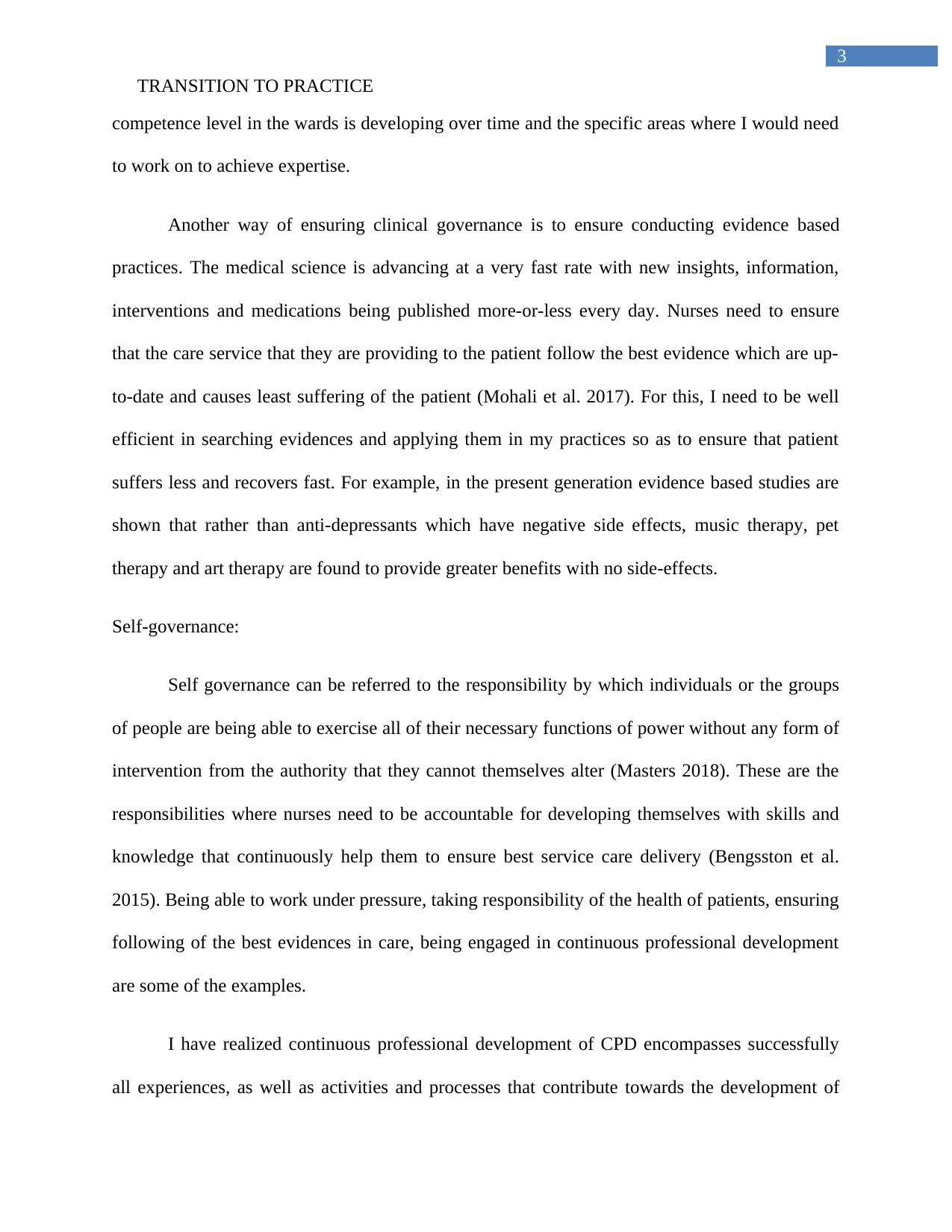
3
TRANSITION TO PRACTICE
competence level in the wards is developing over time and the specific areas where I would need
to work on to achieve expertise.
Another way of ensuring clinical governance is to ensure conducting evidence based
practices. The medical science is advancing at a very fast rate with new insights, information,
interventions and medications being published more-or-less every day. Nurses need to ensure
that the care service that they are providing to the patient follow the best evidence which are up-
to-date and causes least suffering of the patient (Mohali et al. 2017). For this, I need to be well
efficient in searching evidences and applying them in my practices so as to ensure that patient
suffers less and recovers fast. For example, in the present generation evidence based studies are
shown that rather than anti-depressants which have negative side effects, music therapy, pet
therapy and art therapy are found to provide greater benefits with no side-effects.
Self-governance:
Self governance can be referred to the responsibility by which individuals or the groups
of people are being able to exercise all of their necessary functions of power without any form of
intervention from the authority that they cannot themselves alter (Masters 2018). These are the
responsibilities where nurses need to be accountable for developing themselves with skills and
knowledge that continuously help them to ensure best service care delivery (Bengsston et al.
2015). Being able to work under pressure, taking responsibility of the health of patients, ensuring
following of the best evidences in care, being engaged in continuous professional development
are some of the examples.
I have realized continuous professional development of CPD encompasses successfully
all experiences, as well as activities and processes that contribute towards the development of
TRANSITION TO PRACTICE
competence level in the wards is developing over time and the specific areas where I would need
to work on to achieve expertise.
Another way of ensuring clinical governance is to ensure conducting evidence based
practices. The medical science is advancing at a very fast rate with new insights, information,
interventions and medications being published more-or-less every day. Nurses need to ensure
that the care service that they are providing to the patient follow the best evidence which are up-
to-date and causes least suffering of the patient (Mohali et al. 2017). For this, I need to be well
efficient in searching evidences and applying them in my practices so as to ensure that patient
suffers less and recovers fast. For example, in the present generation evidence based studies are
shown that rather than anti-depressants which have negative side effects, music therapy, pet
therapy and art therapy are found to provide greater benefits with no side-effects.
Self-governance:
Self governance can be referred to the responsibility by which individuals or the groups
of people are being able to exercise all of their necessary functions of power without any form of
intervention from the authority that they cannot themselves alter (Masters 2018). These are the
responsibilities where nurses need to be accountable for developing themselves with skills and
knowledge that continuously help them to ensure best service care delivery (Bengsston et al.
2015). Being able to work under pressure, taking responsibility of the health of patients, ensuring
following of the best evidences in care, being engaged in continuous professional development
are some of the examples.
I have realized continuous professional development of CPD encompasses successfully
all experiences, as well as activities and processes that contribute towards the development of
Paraphrase This Document
Need a fresh take? Get an instant paraphrase of this document with our AI Paraphraser
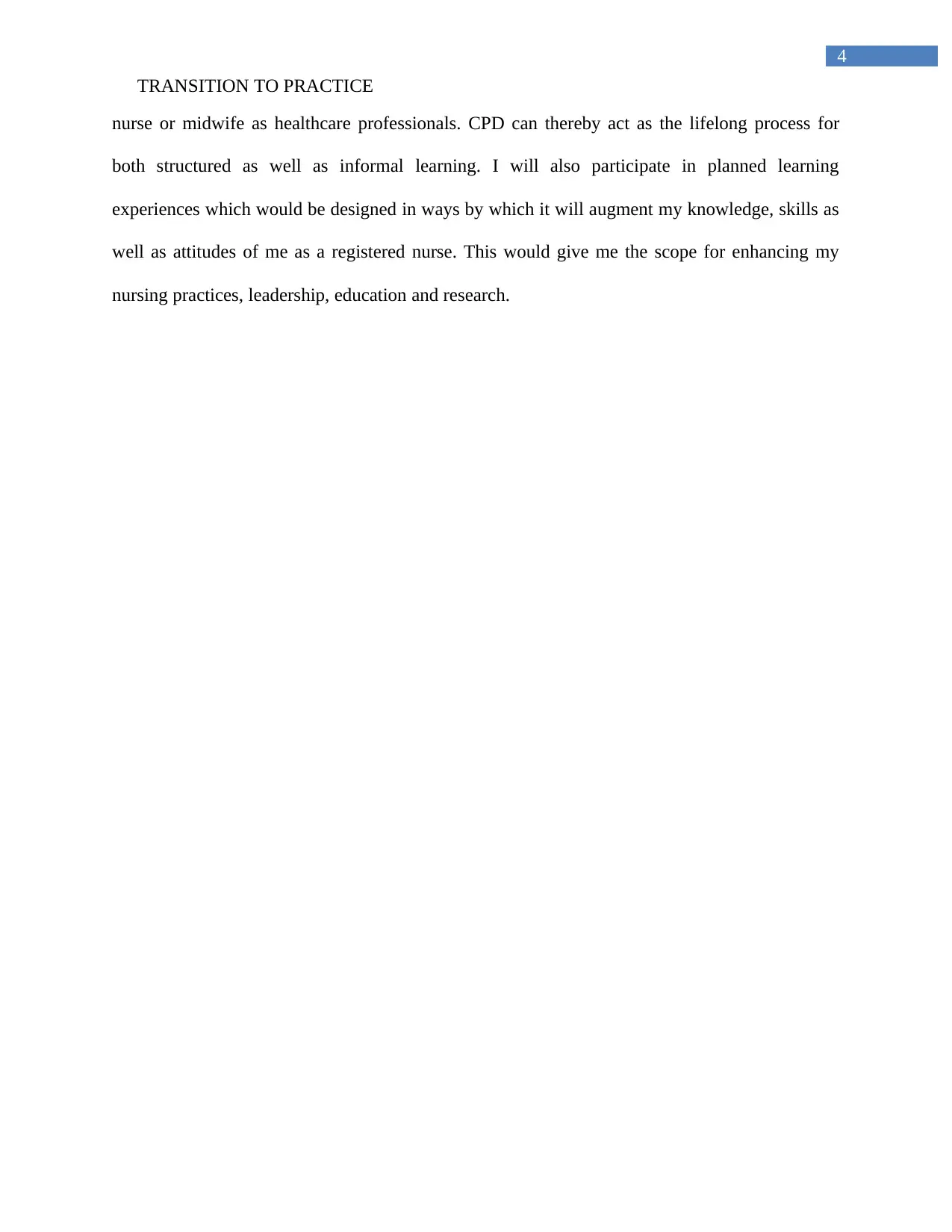
4
TRANSITION TO PRACTICE
nurse or midwife as healthcare professionals. CPD can thereby act as the lifelong process for
both structured as well as informal learning. I will also participate in planned learning
experiences which would be designed in ways by which it will augment my knowledge, skills as
well as attitudes of me as a registered nurse. This would give me the scope for enhancing my
nursing practices, leadership, education and research.
TRANSITION TO PRACTICE
nurse or midwife as healthcare professionals. CPD can thereby act as the lifelong process for
both structured as well as informal learning. I will also participate in planned learning
experiences which would be designed in ways by which it will augment my knowledge, skills as
well as attitudes of me as a registered nurse. This would give me the scope for enhancing my
nursing practices, leadership, education and research.
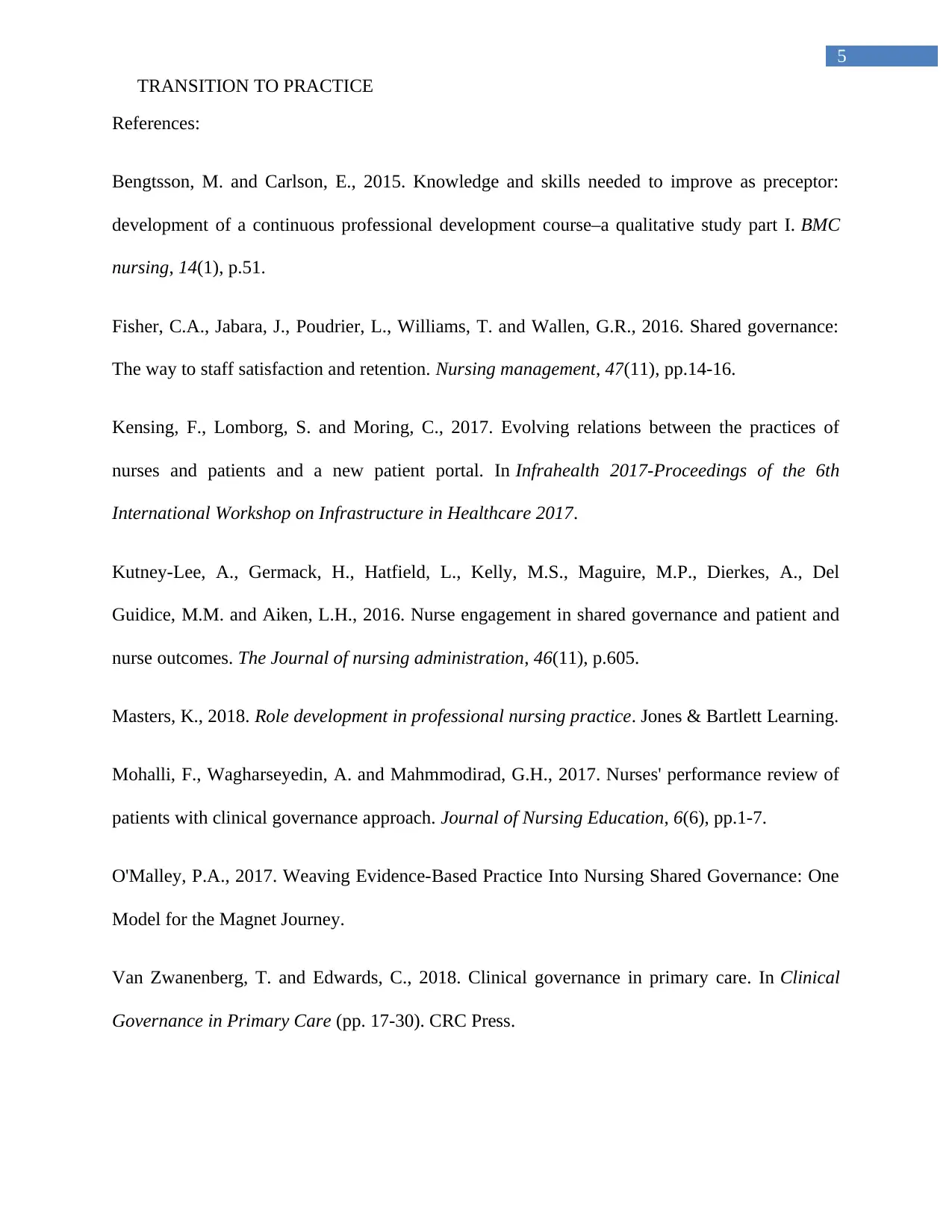
5
TRANSITION TO PRACTICE
References:
Bengtsson, M. and Carlson, E., 2015. Knowledge and skills needed to improve as preceptor:
development of a continuous professional development course–a qualitative study part I. BMC
nursing, 14(1), p.51.
Fisher, C.A., Jabara, J., Poudrier, L., Williams, T. and Wallen, G.R., 2016. Shared governance:
The way to staff satisfaction and retention. Nursing management, 47(11), pp.14-16.
Kensing, F., Lomborg, S. and Moring, C., 2017. Evolving relations between the practices of
nurses and patients and a new patient portal. In Infrahealth 2017-Proceedings of the 6th
International Workshop on Infrastructure in Healthcare 2017.
Kutney-Lee, A., Germack, H., Hatfield, L., Kelly, M.S., Maguire, M.P., Dierkes, A., Del
Guidice, M.M. and Aiken, L.H., 2016. Nurse engagement in shared governance and patient and
nurse outcomes. The Journal of nursing administration, 46(11), p.605.
Masters, K., 2018. Role development in professional nursing practice. Jones & Bartlett Learning.
Mohalli, F., Wagharseyedin, A. and Mahmmodirad, G.H., 2017. Nurses' performance review of
patients with clinical governance approach. Journal of Nursing Education, 6(6), pp.1-7.
O'Malley, P.A., 2017. Weaving Evidence-Based Practice Into Nursing Shared Governance: One
Model for the Magnet Journey.
Van Zwanenberg, T. and Edwards, C., 2018. Clinical governance in primary care. In Clinical
Governance in Primary Care (pp. 17-30). CRC Press.
TRANSITION TO PRACTICE
References:
Bengtsson, M. and Carlson, E., 2015. Knowledge and skills needed to improve as preceptor:
development of a continuous professional development course–a qualitative study part I. BMC
nursing, 14(1), p.51.
Fisher, C.A., Jabara, J., Poudrier, L., Williams, T. and Wallen, G.R., 2016. Shared governance:
The way to staff satisfaction and retention. Nursing management, 47(11), pp.14-16.
Kensing, F., Lomborg, S. and Moring, C., 2017. Evolving relations between the practices of
nurses and patients and a new patient portal. In Infrahealth 2017-Proceedings of the 6th
International Workshop on Infrastructure in Healthcare 2017.
Kutney-Lee, A., Germack, H., Hatfield, L., Kelly, M.S., Maguire, M.P., Dierkes, A., Del
Guidice, M.M. and Aiken, L.H., 2016. Nurse engagement in shared governance and patient and
nurse outcomes. The Journal of nursing administration, 46(11), p.605.
Masters, K., 2018. Role development in professional nursing practice. Jones & Bartlett Learning.
Mohalli, F., Wagharseyedin, A. and Mahmmodirad, G.H., 2017. Nurses' performance review of
patients with clinical governance approach. Journal of Nursing Education, 6(6), pp.1-7.
O'Malley, P.A., 2017. Weaving Evidence-Based Practice Into Nursing Shared Governance: One
Model for the Magnet Journey.
Van Zwanenberg, T. and Edwards, C., 2018. Clinical governance in primary care. In Clinical
Governance in Primary Care (pp. 17-30). CRC Press.
⊘ This is a preview!⊘
Do you want full access?
Subscribe today to unlock all pages.

Trusted by 1+ million students worldwide

6
TRANSITION TO PRACTICE
TRANSITION TO PRACTICE
1 out of 7
Related Documents
Your All-in-One AI-Powered Toolkit for Academic Success.
+13062052269
info@desklib.com
Available 24*7 on WhatsApp / Email
![[object Object]](/_next/static/media/star-bottom.7253800d.svg)
Unlock your academic potential
Copyright © 2020–2026 A2Z Services. All Rights Reserved. Developed and managed by ZUCOL.





